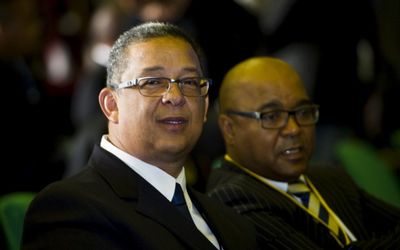SUSPENDED Independent Police Investigative Directorate (Ipid) boss Robert McBride is due to find out on Friday whether Police Minister Nathi Nhleko was entitled under the law to suspend him. The High Court in Pretoria’s judgment could determine how far the Constitution goes in insulating Ipid from state control.
The minister suspended Mr McBride in March, accusing him of allegedly covering up the involvement of senior Hawks officials including the sacked head of the unit in Gauteng, Shadrack Sibiya, in unlawful renditions.
However, Mr McBride obtained an interdict from the Labour Court preventing any internal disciplinary process from going ahead until the case dealing with the constitutional question has been finally decided.
This means that unless High Court Judge Fayeeza Kathree-Setiloane orders differently, Mr McBride’s disciplinary process will remain on hold until the matter has been decided by the Constitutional Court. This is so because if the judge strikes down sections of the Ipid Act, her order will have to be confirmed by the Constitutional Court. If she does not, it is likely to be appealed against.
Mr Nhleko accused Mr McBride of altering an Ipid report on former Hawks head Anwa Dramat and Maj-Gen Sibiya’s involvement in the unlawful renditions of Zimbabweans. An initial Ipid report implicated the two, but the final draft of the report appeared to exonerate them.
Following the allegations, Lt-Gen Dramat resigned and took a package, while Maj-Gen Sibiya was fired after an internal disciplinary hearing found him guilty of involvement in the renditions. He is fighting the finding.
Mr Nhleko said Mr McBride had lied, contradicted facts and made a "crude and deliberate attempt" to cover up for Lt-Gen Dramat. Mr McBride has emphatically denied this.
However, the focus of the case, in which judgment is expected on Friday, is not on the rendition allegations, but whether the police minister may, under the Constitution, suspend and remove the head of the police watchdog.
In court, Mr McBride has argued that all the laws that exist to protect the police watchdog’s independence mean nothing if the minister has an unhindered power to axe the Ipid head.
Steven Budlender, counsel for Mr McBride, said the principles set out by the Constitutional Court in judgments dealing with the Hawks’s independence applied with even more force to Ipid — especially because the Constitution explicitly refers to an "independent" watchdog.
When dealing with the Hawks legislation, the highest court scrapped a section of the South African Police Service Act that allowed the minister to suspend and remove the head of the Hawks, saying that it gave the minister "almost untrammelled power to axe" him.
Mr Budlender said the minister was politically responsible for any wrongdoing by the police. If the body established to investigate such wrongdoing was accountable to the minister, there was "an obvious conflict of interest".
But William Mokhari SC, for the minister, argued that the Hawks was a different institution to Ipid and that institutions had varying degrees of independence. Ipid’s mandate was more limited than that of the Hawks.
In court, Mr Mokhari said the minister was not part of the police and it would be a different matter if the Ipid head could be removed by the police commissioner.

SUSPENDED: Robert McBride. Picture: GALLO IMAGES/THEANA BREUGEM
SUSPENDED Independent Police Investigative Directorate (Ipid) boss Robert McBride is due to find out on Friday whether Police Minister Nathi Nhleko was entitled under the law to suspend him. The High Court in Pretoria’s judgment could determine how far the Constitution goes in insulating Ipid from state control.
The minister suspended Mr McBride in March, accusing him of allegedly covering up the involvement of senior Hawks officials including the sacked head of the unit in Gauteng, Shadrack Sibiya, in unlawful renditions.
However, Mr McBride obtained an interdict from the Labour Court preventing any internal disciplinary process from going ahead until the case dealing with the constitutional question has been finally decided.
This means that unless High Court Judge Fayeeza Kathree-Setiloane orders differently, Mr McBride’s disciplinary process will remain on hold until the matter has been decided by the Constitutional Court. This is so because if the judge strikes down sections of the Ipid Act, her order will have to be confirmed by the Constitutional Court. If she does not, it is likely to be appealed against.
Mr Nhleko accused Mr McBride of altering an Ipid report on former Hawks head Anwa Dramat and Maj-Gen Sibiya’s involvement in the unlawful renditions of Zimbabweans. An initial Ipid report implicated the two, but the final draft of the report appeared to exonerate them.
Following the allegations, Lt-Gen Dramat resigned and took a package, while Maj-Gen Sibiya was fired after an internal disciplinary hearing found him guilty of involvement in the renditions. He is fighting the finding.
Mr Nhleko said Mr McBride had lied, contradicted facts and made a "crude and deliberate attempt" to cover up for Lt-Gen Dramat. Mr McBride has emphatically denied this.
However, the focus of the case, in which judgment is expected on Friday, is not on the rendition allegations, but whether the police minister may, under the Constitution, suspend and remove the head of the police watchdog.
In court, Mr McBride has argued that all the laws that exist to protect the police watchdog’s independence mean nothing if the minister has an unhindered power to axe the Ipid head.
Steven Budlender, counsel for Mr McBride, said the principles set out by the Constitutional Court in judgments dealing with the Hawks’s independence applied with even more force to Ipid — especially because the Constitution explicitly refers to an "independent" watchdog.
When dealing with the Hawks legislation, the highest court scrapped a section of the South African Police Service Act that allowed the minister to suspend and remove the head of the Hawks, saying that it gave the minister "almost untrammelled power to axe" him.
Mr Budlender said the minister was politically responsible for any wrongdoing by the police. If the body established to investigate such wrongdoing was accountable to the minister, there was "an obvious conflict of interest".
But William Mokhari SC, for the minister, argued that the Hawks was a different institution to Ipid and that institutions had varying degrees of independence. Ipid’s mandate was more limited than that of the Hawks.
In court, Mr Mokhari said the minister was not part of the police and it would be a different matter if the Ipid head could be removed by the police commissioner.





















Change: -1.87%
Change: -1.56%
Change: -5.10%
Change: -0.75%
Change: -0.06%
Data supplied by Profile Data
Change: 0.00%
Change: 0.00%
Change: -1.87%
Change: 0.00%
Change: 0.00%
Data supplied by Profile Data
Change: 0.07%
Change: -0.05%
Change: -0.01%
Change: 3.31%
Change: 0.11%
Data supplied by Profile Data
Change: 0.00%
Change: 0.00%
Change: 0.00%
Change: 0.00%
Change: 0.00%
Data supplied by Profile Data